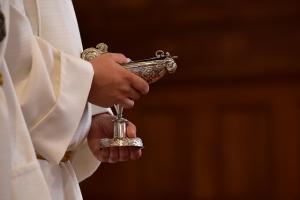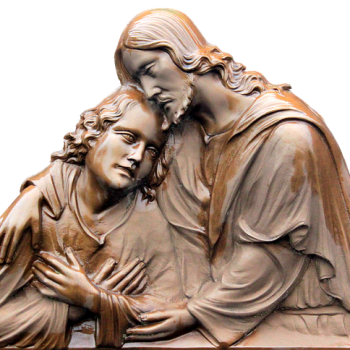“Why do Catholics do that?” is a question often asked. I think we could say in return: “Why don’t other Christians do that?” For example, Catholics are known for using incense, but why don’t Protestants use it as well?
Old Testament Use of Incense
The Biblical significance and symbolism of incense warrants its place in worship. In Psalm 141:2 we have the plea: “Let my prayer come like incense before you.” Revelation 8:4 says: “From the angel’s hand the smoke of the incense went up before God, and with it the prayers of God’s people.”
The use of incense comes from our Old Testament roots. In Exodus, the Lord actually gives Moses a recipe for the incense to be used at the Tabernacle. According to one source, incense is mentioned a total of 121 times in the Bible in 18 different books. Seems to me that frequency ought to catch every Christian’s attention.
In ancient cultures, pagans also employed incense in ceremonies to their gods. The rising smoke of burning incense naturally symbolizes prayer rising to heaven. Similarly, Tibetan prayer flags send the petitions of believers out on the winds to the benefit of all.
Incense was a highly prized, expensive substance traded across the Near East. It was the reason for the great wealth of Sheba and the rest of Arabia. Consequently, the burning of incense was a fitting way to honor kings, including the Roman Emperors.

It is no surprise then that the Magi brought frankincense to the newborn King. They also brought myrrh, which is an anointing oil but also used in the making of incense.
In many cultures, incense is burnt for its perfume. Since Old Testament use of incense was often in connection with the burnt offerings of animals, the incense might have been doing double duty to convey prayers upward and to mask the burnt flesh odor.
New Testament Use of Incense
The relationship between incense and a sacrificial offering connects incense to the death of Christ.
Some may think that incense went out of style when we ceased to sacrifice animals. Instead, it remains significance because it is both a precious substance worthy of Christ the King and, as a (thankfully bloodless) burnt offering, a remembrance of Christ’s sacrifice for our sins.
Early Christians certainly appreciated the symbolism of incense. I have previously referred to Revelation 8:4; in addition, John’s vision, as described in Revelation 5:8, foresaw 24 elders holding gold bowls filled with incense.
In Second Corinthians, Paul uses the image of incense to illustrate the mission of a Christian: “Thanks be to God who . . . employs us to diffuse the fragrance of His knowledge everywhere! We are an aroma of Christ for God’s sake.” (2 Cor 2:14-15)
Catholic Use of Incense

In the Catholic Church, burning incense is therefore used as a sign of reverence and dedication. It is a sacramental like holy water or the sign of the cross.
For example, we incense the altar, which represents Christ’s sacrifice, as a sign of respect for His suffering and death on our behalf.
We also incense other objects that have symbolic significance such as the Easter candle that represents Christ as the Light of the World. At a solemn Mass, we incense the Missal in reverence for the Word of God and Christ, the Word Incarnate.
We incense the Blessed Sacrament at Benediction as a means of adoration in Christ’s presence. Once again, we are honoring God with the gift fit for a king.
At a funeral Mass, we incense the body as a sign of respect because it was once a temple of God.
Surely Protestants could find it appropriate as well to use incense. Before the preacher gives his/her sermon, wouldn’t it be fitting for him/her to incense the Bible?
Since incense is apparently so important to God (after all, He dictated a recipe to make sure it was made right), may I suggest that Protestants consider adding incense back into their practice of Christianity? It would be a way to renew and strengthen their connection to a long Judeo-Christian heritage.
The celebrant at our Mass last Sunday said we need to “Wake up and smell the incense!” Indeed, for Catholics too, a return to using incense more often might increase our sense of reverence and awe and wake us up to a renewed dedication to our faith.
















